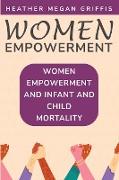- Start
- Women Empowerment and Infant and Child Mortality
Women Empowerment and Infant and Child Mortality
Angebote / Angebote:
Empowerment and demographic outcomes has grown, despite the increase in empowerment
research, findings on the relationship between empowerment and demographic indicators are
inconsistent. Particularly in the health and mortality literature, this inconsistency is due to several
factors, including differing definitions, measures, and social contexts of empowerment. The
inclusion of social networks and social institutions may better inform the definitions and
measurement of empowerment. Data for this study comes from the 2004 Malawi Demographic
and Health Survey from 5, 982 mothers with 8, 286 infants and children. Multivariate logistic
hazard models, conducted separately for infants and children, investigate how demographic,
socioeconomic, proximate, and empowerment measures are related to child mortality. Results
show that household wealth is an important factor related to both infant and child mortality. For
children, this relationship is mediated by other demographic factors. For both infants and
children, being born to a mother who is divorced increases the odds of death (although this is
mediated by birth characteristics for infants).
(decision-making about visiting family or friends and control over contact with family) is an
important factor related to mortality. For children, if the final say about health care decisions are
made by the husband (or someone else), the likelihood of mortality increases. However, despite
these significant findings, the majority of empowerment measures are not significantly related to
both infant and child mortality.
Folgt in ca. 10 Arbeitstagen
